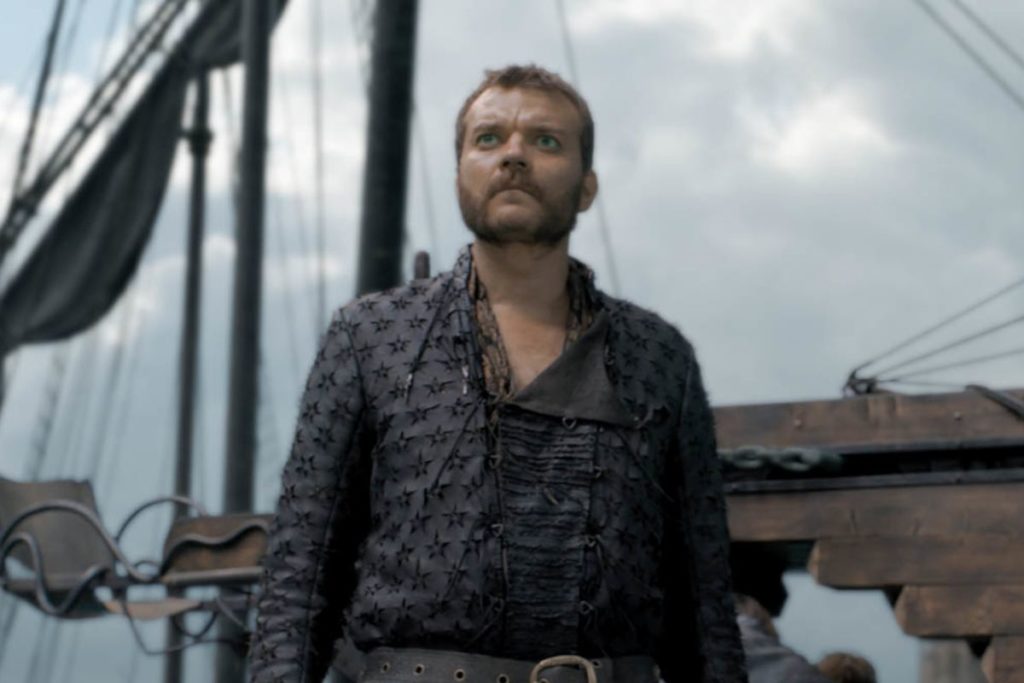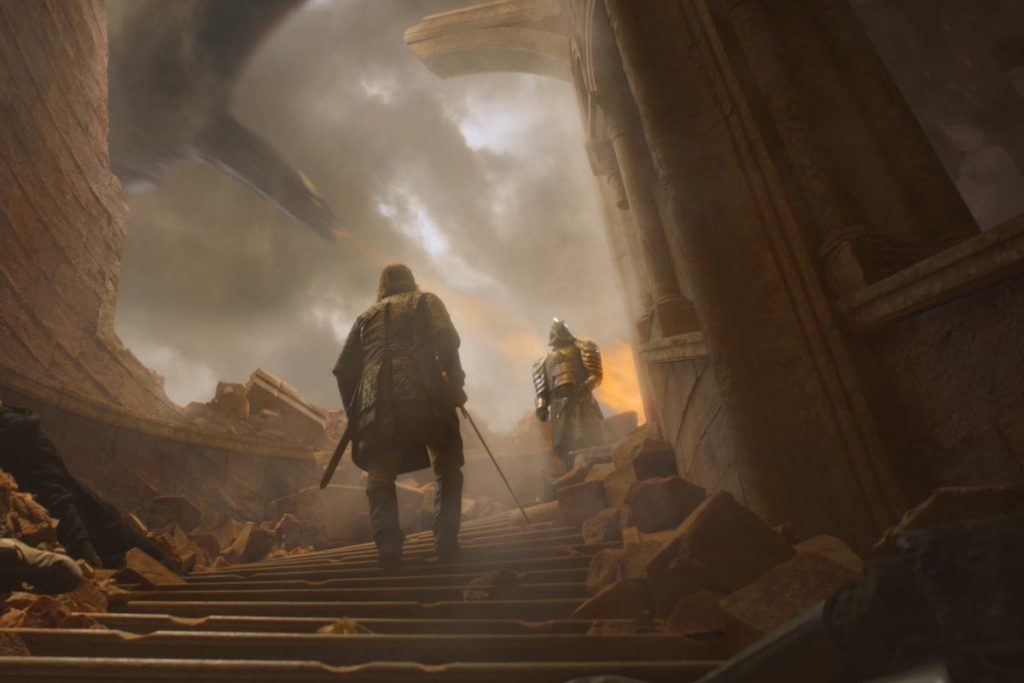- Culture
- 13 May 19

Warning: Spoilers ahead.
How much pressure must DB Weiss and David Benioff have been feeling these past two years? Ever since the ending of Season 5, the Game of Thrones writers have been in uncharted waters with the biggest, most successful, most expansive TV show of all time. We all like to believe that George RR Martin is in the background pulling all the strings, making all the executive decisions, guiding them towards playing out exactly how he intended it all to end - but in the back of our heads, we know that that's not true.
Book lovers will know well that A Song of Ice and Fire was originally supposed to be a trilogy. It then evolved into four novels, then five. Now, for the last 8 years, fans have been waiting on a sixth novel, The Winds of Winter, which still doesn't have a publication date.
In terms of the plot, Martin is further away from wrapping things up now than he was with first instalment of ASOIAF. He's revelling in this universe he's created. He enjoys getting into characters' minds. He enjoys bringing in a new cast of characters with every book, getting into their minds too, expanding his universe. It makes for great reading - truly it does.
But an ending? Damned if any bookreader could say they knew where the hell all of it was going.
Big TV successes make for stricter demands than publishing. HBO announced in 2016 that the 8th season of Game of Thrones would be the last. For the writers, it was officially squeaky bum time. Everything would now hinge on a handful of episodes.
Advertisement
The Mad Queen
Season 8, so far, has been the fast-moving culmination of everything coming together. The previous episodes have been exhilarating but rushed, climactic but clunky.
But even by this season's standards, last night's episode felt like a watershed moment.
This was an episode where many of the characters finally revealed their true nature. Daenerys revealed herself to be a mad, tyrannical Queen who thought nothing of setting fire to King's Landing. Jaime revealed himself to be loyal, in the end, to Cersei and to the worst side of himself. Arya revealed herself to less cold and vengeful as she'd made herself believe. Jon revealed himself to be mistaken for having blind faith in his Queen. And Tyrion - inexplicably, against all his character development throughout the first few seasons - revealed himself to be nonstrategic, easily misled, naive.
We know that this has all been gearing up for a big finale. We know this. We know there's only six episodes left and everything is moving a lot faster than we'd like and that characters are doing things which sometimes don't make sense. We know that there's a teleological bent to plot now that there wasn't in the past. There's a sense of an ending about it. It means that main characters can't just die randomly anymore. It means the Hound has to give a hammy speech to Arya that allows her to turn back from killing Cersei and, in doing so, survive the battle of King's Landing. It means that the 30,000-strong Golden Company have to be killed off precisely 20 seconds after having arrived on the show.
We've suspended our disbelief about all that. We've given a pass to clunky writing.
Advertisement
But there were massive leaps in this episode that were so pivotal - yet so inexplicable - that they felt unearned. Chiefly, Daenerys' decision to burn the innocent people of King's Landing felt like a reach too far. Sure, we've seen Cersei kill Dany's best friend. We've seen all of her best advisers are either die (Barristan Selmy, Jorah Mormont), depart (Dario Naharis) or act against what she believes to be her best interests (Jon Snow, Varys, Tyrion). We've also seen that her character arc has given her a tyrannical edge and that, as early as Season 2, she was pledging to "take back what is mine, with fire and blood". But this?
I'm no diehard fan of Daenerys, and I believe that it would've made complete sense for her to turn villain - the foreshadowing is certainly there throughout the show - but the pace at which this turnaround happened, and the circumstances surrounding it, make it ever so slightly ridiculous. Two episodes ago, Daenerys was ready to lay down her own life, and that of her army and her dragons, to save the living. Now, despite being on the cusp of victory, she's at her wit's end, wantonly killing everyone around her.
And for what reason? In the end, none of this would even have made sense as a tough-but-necessary military strategy. We see in the episode that dragonfire brings down towers, destroys Iron Fleets, burns up crossbow-wielders, all within a matter of minutes. Why did no one talk about the fact that she could just destroy the Red Keep and leave the rest of the city intact? It's just sloppy writing.
What we got instead was Daenerys going through a sustained period of aerial madness, clinically burning street after street after street, and giving the two armies that she's trained to respect innocent lives the go-ahead to kill at will.
Really? Even in Meereen, where Daenerys fought constant losing battles, and where she didn't have the same stake in being a ruler as in the Seven Kingdoms, there was never a hint that she'd take the nuclear option. All of this was a monumental character jump, even by latter-seasons Game of Thrones standards.
(Please, for the countless dissenters out there who think "But you watch a show about dragons and zombies! How can you not believe that X character might do Y?" is a smart retort, don't bother. This is about established character arcs and believable plots. If the show was one big incomprehensive magic free-for-all, it wouldn't be worth watching.)

Advertisement
Confrontations
The Daenerys-descent-into-madness storyline wasn't the only let-down of this episode. The oafish, endlessly-unlikable Euron Greyjoy had his denouement in a style that was befitting of his lack-of-character. Crawling out of the sea at an alcove by the Red Keep, he baited Jaime Lannister into one-on-one combat, nearly won, didn't, then appeared to die somewhat happy that he'd wounded the Kingslayer enough that he'd probably dealt him a fatal blow. Euron had tested the patience of ASOIAF book lovers - wherein he was written as a much more ruthless, nuanced, calculating and sinister villain - so even the sight of him being his shoddy TV-self is enough to make the blood pressure rise. In many ways, it was a relief to finally see him offed.
Cleganebowl was finally confirmed with this episode, as Sandor Clegane and the mutated version of his brother Gregor had their face-off on the stairs of the Red Keep. This had been much hyped, and unlike the Jaime/Euron fight, this one was a lot more engrossing and had a fair bit of pay-off. But even here, there was still that sense of bathos. The fight felt cheapened by the fact that so much killing was going on around it, or by the way that Cersei awkwardly, politely, excused herself from the scene. Even the way the fight was edited - intercut with scenes of Arya escaping King's Landing, clearly showing her affinity with The Hound - didn't really work as they might've been intended (although one benefit is that it did produce this Renaissance painting-esque shot).

Final Episode
And yet, despite my misgivings, I didn't hate this episode. As an exploration of the impossibility of a 'clean war', this was a phenomenal episode - one of the best that GoT has given us in that regard, and one which it badly needed to. In the scenes where the Northern Army, the Unsullied and the Dothraki combined to wreak havoc on King's Landing, it made for truly disturbing viewing. The gore and the destruction felt more evocative than ever, but as well as that, you saw the capricious nature of the fighting. It didn't matter who was in the line of fire. It didn't matter who wore which cloak or armour plate. Who'd surrendered and who hadn't. Who were the purported 'goodies' and the 'baddies'. Death seemed to come for everyone. There were no victors here.
This was an episode that admonished us for expecting anything better from war and destruction. It laughed wryly at our hopes that the wheel could ever be broken. In Season 6, Bran was shown that it was humankind that led the Children to create the White Walkers out of desperation. Haven't they always been the real enemy? Man's inhumanity to man, wasn't that always the problem?
Advertisement
We'll see where it leads in a week's time. Enough storylines have been killed off that we're fully set up for an exciting final episode.
One thing you can bet on now is that, whatever happens next week, this show will almost certainly end on a divisive note...










